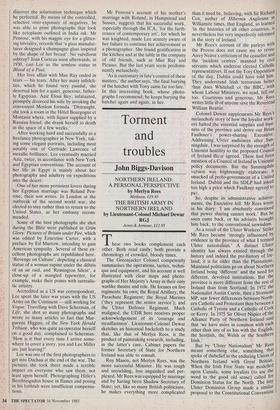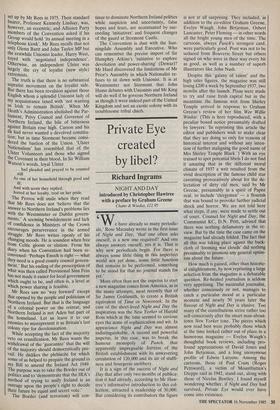Torment and troubles
John Biggs-Davison
NORTHERN IRELAND: A PERSONAL PERSPECTIVE by Merlyn Rees
Methuen, £19.95
THE BRITISH ARMY IN NORTHERN IRELAND by Lieutenant-Colonel Michael Dewar RGJ
Arms & Armour, £12.95
These two books complement each other. Both read easily; both provide a chronology of crowded, bloody times.
The Greenjacket Colonel competently summarises the operations, tactics, techni- que and equipment, and his account is well illustrated with clear maps and photo- graphs of Her Majesty's Army in their only warlike theatre and role. He focuses on five regiments: his own; the Royal Artillery; the Parachute Regiment; the Royal Marines ('they represent the senior service'); and the Ulster Defence Regiment. Much maligned, the UDR here receives proper acknowledgement of its 'courage and steadfastness'. Lieutenant-Colonel Dewar sketches an historical backcloth to a study that, like that of Merlyn Rees, is the product of painstaking research, including, in the latter's case, Cabinet papers the former Secretary of State for Northern Ireland was able to consult.
Roy Mason, not Merlyn Rees, was the more successful Minister. He was tough and unyielding, less anguished and per- plexed. Mr Rees was equipped by marriage and by having been Shadow Secretary of State; yet, like so many British politicians, he makes everything more complicated than it need be, believing, with Sir Richard Cox, auther of Hibernia Anglican" in Williamite times, that England, so learned 'in the histories of all other countries, is nevertheless but very imperfectly informed in the story of Ireland.' Mr Rees's account of the parleys with the Provos does not cause me • to revise Airey Neave's criticism of the ceasefire and the 'incident centres' manned by civil servants which undercut elected Catholic representatives. If not the Tory Opposition of the day, Dublin could haVe told him: They understand Irish terrorsism better than does Whitehall or the .BBC, with whom Labour Ministers, we read, fell out too. Courteous and generous, Mr Rees writes little ill of anyone save the Reverend William Beattie.
Colonel Dewar supplements Mr Rees's melancholy story of how the loyalist work- ers halted,,the essential supplies and busi- ness of the ,province and drove out Brian Faulkner'S power-sharing Executive. Addressing, Ulster audiences after , Sun- ningdale, I was surprised by the strength of Unionist hostility to the proposed Council of Ireland there agreed. There had been mention of a Council of Ireland in Unionist policy documents. But the Sunningdale version was frighteningly elaborate: it smacked of proto-government of a United Ireland. Dublin and the SDLP had asked too high a price which Faulkne,r agreed to pay.
So, despite its administrative achieve- ments, the Executive. fell. Mr Rees wrote in • his diary: 'I am absolutely convinced that power sharing cannot work.' But he_ soon came back, or his advisers brought him back, to the conventional unwisdom.
As a result of the Ulster Workers' Strike Mr Rees became 'strongly influenced by evidence in -the province of what I termed Ulster nationalism.' A distinct Ulster identity has always existed through the history and indeed the pre-history of Ire- land; it is far older than the Plantations. Mainland politicians go on about Northern Ireland being 'different' and the need for different, devolved institutions. But the province is more different from the rest of Ireland than from Scotland. In 1972 the Nationalist Austin Currie, then a Stormont MP, saw fewer differences between North- ern Catholic and Protestant than between a Catholic of Tyrone and a Catholic of Cork or-Kerry. In 1975 Sir Oliver Napier of the Alliance Party of Northern Ireland said that 'we have more in common with each other thah any of us has with the English, the -Scottish, the Welsh or the Southern Irish.'
But by 'Ulster Nationalism' Mr Rees meant something else, something that spoke of disbelief in the enduring Union 01 Northern Ireland with Great Britian. When the Irish Free State was modelled upon Canada, some loyalists .(to use the word in the good old sense) called for Dominion Status for the North. The tiny Ulster Dominion Group made a similar proposal to the Constitutional Convention
set up by Mr Rees in 1975. Their standard bearer, Professor Kennedy Lindsay, was, however, an eccentric; and Alliance Party members of the Convention asked if his Group would hold 'its annual meeting in a telephone kiosk'. Mr Rees recalls that not only Glenn Bartt and John Taylor MP but the erstwhile Unionist leader, Harry West, toyed with 'negotiated independence'. Otherwise, an independent Ulster was largely the cry of loyalist (new style) extremists.
The truth is that there is no substantial sepratist movement on the loyalist side. But there has been revulsion against those English whom a splendid Unionist lady of my acquaintance taxed with 'not wanting us Irish to remain British'. When Mr Heath's Administration abolished the Par- liament, Privy Council and Governor of Northern Ireland, the bile of bitterness against Britain rose high. Carson and his ilk had never wanted a devolved constitu- tion; but in time Stormont became consi- dered the bastion of the Union. 'Ulster Nationalism' has resembled that of the Ulster Volunteers and those who signed the Covenant in their blood. In Sir William Watson's words, loyal Ulster
• . . had pleaded and prayed to be counted still
As one of her household through good and ill; And with scorn they replied, Jeered at her loyalty, trod on her pride.
The Provos will smile when they read that Mr Rees does not 'believe that the answer to Northern Ireland's problems lies with the Westminster or Dublin govern- ments.' A seeming bewilderment and lack of confidence in Ministers of the Crown encourages perseverance in the armed struggle. Mr Rees writes openly of his changing moods. He is soundest when free from Celtic gloom or elation. From his diary when his Convention had been re- convened: 'Perhaps Enoch is right — what they need is a good county council govern- ment.' But his ending of the prescription of what was then called Provisional Sinn Fein has not made it easier for local government which ought to be, and often is, a level at which power sharing is feasible.
Mr Rees saw no 'way forward' except that opened by the people and politicians of Northern Ireland. But that is the language of a colonial power on the retreat; and Northern Ireland is not Aden but part of the homeland. Let us leave it to our enemies to misrepresent it as Britain's last colony ripe for decolonisation.
While accepting the fact of the majority veto on reunification, Mr Rees wants the withdrawal of the 'guarantee' that the will of the majority should democratically pre- vail. He dislikes the plebiscite for which some of us helped to prepare the ground in my Bill to amend the Ireland Act 1949. The purpose was to take the Border out of Politics and to 'demonstrate that the IRA's method of trying to unify Ireland is an outrage upon the people's right to decide their future by equal and secret vote.'
The Border (and terrorism) will con-
tinue to dominate Northern Ireland politics while suspicion and uncertainty, false hopes and fears, are accentuated by suc- ceeding 'initiatives' and frequent changes of the guard at Stormont Castle.
The Convention is dust with the Sun- ningdale Assembly and Executive. Who can remember the precise import of Sir Humphry Atkins's 'initiative to explore devolution and power-sharing' (Dewar)? Mr Hurd discovered the limitations of Mr Prior's Assembly in which Nationalist re- fuses to sit down with Unionist. It is at Westminster not Stormont that John Hume debates with Unionists and Mr King will do well if he governs Northern Ireland as though it were indeed part of the United Kingdom and not an exotic colony with its troublesome tribal chiefs.



































































 Previous page
Previous page